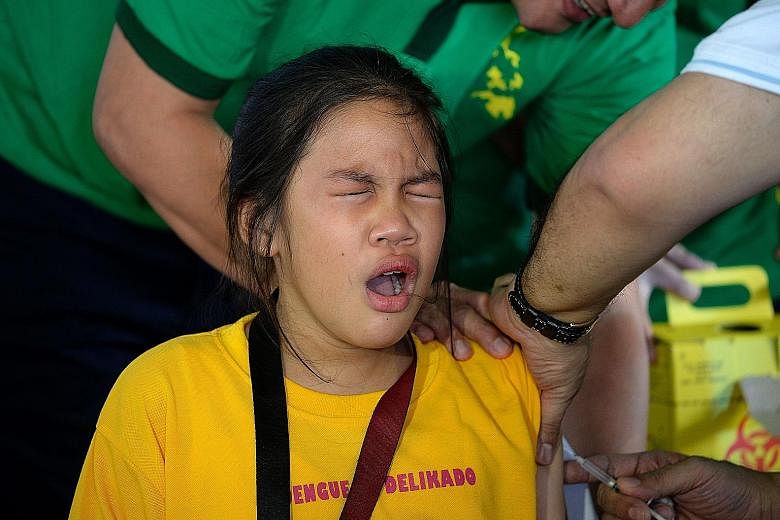The Philippines has begun rolling out the world's first dengue vaccine for more than a million children, amid safety concerns expressed by public health advocates.
About 600 children at a public school in Marikina city, 16km west of Manila, were the first to receive the vaccine Dengvaxia yesterday.
French pharmaceutical giant Sanofi Pasteur created the vaccine, which the Health Ministry said could reduce the number of dengue cases in the Philippines.
It will be given to other children, aged nine, in three regions on the main island of Luzon, including metropolitan Manila, at a cost of 3.5 billion pesos (S$103 million). The children will receive three shots at six-month intervals.
In all, the ministry hopes to reach more than a million children by the year end. It then plans to implement the programme nationwide next year.
-
MOH, HSA 'actively tracking' vaccine
-
Singapore's Ministry of Health (MOH) and Health Sciences Authority (HSA), which regulates health products, have said they are "actively tracking" Dengvaxia.
This vaccine by Sanofi Pasteur is not considered a good fit for the situation in Singapore as it offers best protection against two strains of the dengue virus that are not so commonly found here.
However, it has been shown to be effective in reducing the seriousness of the illness once someone is infected with dengue, regardless of the dengue strain. There are four strains of the virus.
Dengue expert Tikki Pang, who was director of research policy and cooperation at the World Health Organisation from 1999 to 2012, said last month that Dengvaxia is only around 50 per cent effective against the two strains most commonly found here, and 75 per cent effective against the other two strains.
Even then, Professor Pang believes Singapore should give serious thought to making this vaccine available here as soon as possible. Even if the dengue vaccine is not foolproof, it would cut down on the dengue numbers and help to relieve some strain on hospitals and general practitioners, as well as reduce the number of work days lost when people are infected by the virus, he said.
"We have waited more than 40 years for this vaccine. How much longer do we plan to wait?" Prof Pang added.
A study by the state-run University of the Philippines (UP) said the vaccine could cut the number of dengue cases by more than 24 per cent in five years.
The Philippines had 200,000 dengue cases last year, with nearly 600 of them resulting in deaths. This year, about 20,000 cases had been reported until Feb 20.
Health officials estimate that it costs 18,000 pesos to treat each dengue patient.
"I can assure you that just like other vaccines, this dengue vaccine is a safe vaccine," said Dr Rose Capeding from the Research Institute for Tropical Medicine.
But public health advocates urged the ministry to delay the roll-out of Dengvaxia, citing possible adverse effects.
Philippine College of Physicians Foundation president Anthony Leachon said the ministry should first wait for the results of a study commissioned by the World Health Organisation (WHO) on the vaccine's safety, suitability and costs.
"As health advocates, we appeal to the Health Ministry to wait until the study is completed and put in place safeguards to protect children from possible adverse effects on their health."
Dr Antonio Dans, a professor at UP's College of Medicine, warned that while the vaccine could reduce the number of dengue cases, it could later increase the disease's severity, a phenomenon known as "antibody- dependent enhancement".
Citing Sanofi's own studies, he said this could happen three years after the vaccine's introduction.
"The real dengue we are afraid of is severe dengue, not the mild ones. If a vaccine prevents mild disease but causes severe dengue, we shouldn't be using it at all."
Dengvaxia was developed by Sanofi after 25 clinical studies in 15 countries over 20 years.
The WHO had backed the Philippines' use of Dengvaxia.
"It is the prerogative of a country to license the product (and) determine its use based on the internal scientific appraisal of the clinical research that is underpinning the product," said WHO country representative Gundo Weller.
Correction note: An earlier version of this article said the vaccine will be given to children, aged nine and younger. This is incorrect, the vaccine will only be given to children, aged nine. We are sorry for the error.

